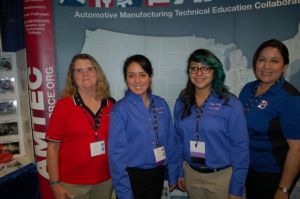
One of Samantha Vera's favorite stories about her friend and classmate Selena Flores is how she helped an engineer build and operate a piece of equipment in their first semester of the Advanced Manufacturing Technology Program (AMT) at St. Philips College.
"He went to a university, and we went to a community college, and she put it all together," Vera said.
At this point in the story, Flores nods her head matter-of-factly explaining that she and Vera learned basic manufacturing skills in the Alamo Area (Dual-Credit) Academies while in high school. In just one course they learned to operate a CNC machine, a milling machine, a drill press, a chop saw, and a band saw.
"It's not, what skills do we have? It's how many skills we have!" Flores said during a showcase session at the 2015 Advanced Technological Education Principal Investigators Conference.
Mary Batch, assistant manager of Human Resource Development, Toyota Motor Manufacturing Texas Inc., and Danine Tomlin, executive director of the Automotive Manufacturing Technical Education Collaborative (AMTEC), were in the exhibit hall booth with Flores and Vera to answer questions about the St. Philips College AMT AAS Degree. The degree program’s curriculum is aligned to AMTEC’s national standards, and was developed by industry and college partners to address Toyota's mechatronics/multi-skilled technician needs.
Students’ Perspective
The young women are among the 11 students (five females, six males) in the second Toyota AMT cohort working their way through the five-semester, associate degree program developed at St. Philips College, which was upgraded to AMTEC’s national standards in close partnership with Toyota. Flores and Vera began immediately after finishing high school.
"The summer semester is intense, and though I don't get to go to the river as much and hang out with my friends, I'm getting this education, and it's so great. And I have a job, and it's really, really good," Flores said. Vera also participated in Toyota's eight-week paid internship in the summer between her junior and senior years in high school.
All the AMT students work as paid interns (earning $12 to $16 per hour) three days a week at the Toyota facility near the St. Philips campus. Their class days begin on the San Antonio, Texas, campus at 7 a.m. and end at 7:20 p.m.
This semester they have courses in robotics, instrumentation systems, programmable logic controllers, and arc welding. Flores and Vera say the courses are challenging, but they like what they are learning. When they are not in class they are either working at Toyota or studying with the other students in the program. When they graduate in May 2016 the women hope to have job offers from Toyota.
Employer’s Perspective
Fourteen of the 16 graduates from the first AMT cohort are now Toyota employees, Batch said. The other two graduates are enrolled in bachelor's degree programs.
Batch said those first hires "actually closed the gap" in the company's technical workforce.
"We are in a major city, we lose a lot of our folks to other industry," she added.
"What we found [is] this younger generation, they're staying with us. They are very, very loyal. They've actually been given an opportunity, and they know that," Batch said. The program pamphlet states that AMT graduates hired by Toyota have the potential to earn $50,000 per year plus excellent benefits.
How AMTEC Addressed Industry Needs
AMTEC conducted national research to confirm the skill sets that auto manufacturers and related industries need, and then developed a competency-based modularized online curriculum, a general mechatronics certification assessment, and diagnostic/topic level assessments.
AMTEC then worked with its industry partners to vet all products for relevance, accuracy, and alignment with its national research findings. College partners have adopted their own credit and non-credit models to address the community, culture, and workforce needs of automakers and manufacturers in various U.S. locations.
For instance, the Tennessee College of Applied Technology (TCAT) model, which partners with Nissan in Tennessee, holds classes in the company's facility.
During a presentation at the ATE Principal Investigators Conference in October in Washington, D.C., Tomlin said the AMTEC curriculum and labs are meant to develop hands-on and problem-solving skills equal to what technicians typically learn in five to seven years on the job.
Tomlin explained this is exactly what industry asked for, a competency-based accelerated education model that has students spend more time “learning by doing” rather than “learning from lecturing.”

 Subscribe
Subscribe


 See More ATE Impacts
See More ATE Impacts

Comments
There are no comments yet for this entry. Please Log In to post one.